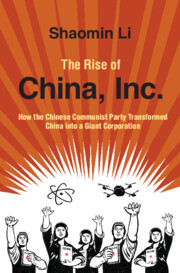45 results
Part II - The Rise of China, Inc.
-
- Book:
- The Rise of China, Inc.
- Published online:
- 06 January 2022
- Print publication:
- 27 January 2022, pp 127-174
-
- Chapter
- Export citation
9 - Policy and Strategic Options for Governments and Firms in the Democracies
- from Part III - China, Inc.’s Achilles’ Heel and the World’s Response
-
- Book:
- The Rise of China, Inc.
- Published online:
- 06 January 2022
- Print publication:
- 27 January 2022, pp 254-277
-
- Chapter
- Export citation
7 - The Chinese Communist Party’s Dilemmas and Solutions
- from Part III - China, Inc.’s Achilles’ Heel and the World’s Response
-
- Book:
- The Rise of China, Inc.
- Published online:
- 06 January 2022
- Print publication:
- 27 January 2022, pp 177-218
-
- Chapter
- Export citation
3 - China’s Legal System Is Not about the Rule of Law
- from Part I - The Advantage of Low Human Rights
-
- Book:
- The Rise of China, Inc.
- Published online:
- 06 January 2022
- Print publication:
- 27 January 2022, pp 49-92
-
- Chapter
- Export citation
References
-
- Book:
- The Rise of China, Inc.
- Published online:
- 06 January 2022
- Print publication:
- 27 January 2022, pp 278-322
-
- Chapter
- Export citation
Copyright page
-
- Book:
- The Rise of China, Inc.
- Published online:
- 06 January 2022
- Print publication:
- 27 January 2022, pp iv-iv
-
- Chapter
- Export citation
Index
-
- Book:
- The Rise of China, Inc.
- Published online:
- 06 January 2022
- Print publication:
- 27 January 2022, pp 323-336
-
- Chapter
- Export citation
4 - Mao plus Deng
- from Part I - The Advantage of Low Human Rights
-
- Book:
- The Rise of China, Inc.
- Published online:
- 06 January 2022
- Print publication:
- 27 January 2022, pp 93-126
-
- Chapter
- Export citation
2 - The Political Foundation of China’s Competitiveness and Its Failure to Democratize
- from Part I - The Advantage of Low Human Rights
-
- Book:
- The Rise of China, Inc.
- Published online:
- 06 January 2022
- Print publication:
- 27 January 2022, pp 15-48
-
- Chapter
- Export citation
Acknowledgments
-
- Book:
- The Rise of China, Inc.
- Published online:
- 06 January 2022
- Print publication:
- 27 January 2022, pp ix-x
-
- Chapter
- Export citation
8 - Open Societies versus Closed Regime
- from Part III - China, Inc.’s Achilles’ Heel and the World’s Response
-
- Book:
- The Rise of China, Inc.
- Published online:
- 06 January 2022
- Print publication:
- 27 January 2022, pp 219-253
-
- Chapter
- Export citation
5 - The Emergence of China, Inc.
- from Part II - The Rise of China, Inc.
-
- Book:
- The Rise of China, Inc.
- Published online:
- 06 January 2022
- Print publication:
- 27 January 2022, pp 129-154
-
- Chapter
- Export citation
1 - Introduction
-
- Book:
- The Rise of China, Inc.
- Published online:
- 06 January 2022
- Print publication:
- 27 January 2022, pp 1-12
-
- Chapter
- Export citation
Part I - The Advantage of Low Human Rights
-
- Book:
- The Rise of China, Inc.
- Published online:
- 06 January 2022
- Print publication:
- 27 January 2022, pp 13-126
-
- Chapter
- Export citation
Dedication
-
- Book:
- The Rise of China, Inc.
- Published online:
- 06 January 2022
- Print publication:
- 27 January 2022, pp v-vi
-
- Chapter
- Export citation
Part III - China, Inc.’s Achilles’ Heel and the World’s Response
-
- Book:
- The Rise of China, Inc.
- Published online:
- 06 January 2022
- Print publication:
- 27 January 2022, pp 175-277
-
- Chapter
- Export citation
6 - China’s Industrial Policy as a Corporate Strategy of China, Inc.
- from Part II - The Rise of China, Inc.
-
- Book:
- The Rise of China, Inc.
- Published online:
- 06 January 2022
- Print publication:
- 27 January 2022, pp 155-174
-
- Chapter
- Export citation
Contents
-
- Book:
- The Rise of China, Inc.
- Published online:
- 06 January 2022
- Print publication:
- 27 January 2022, pp vii-viii
-
- Chapter
- Export citation

The Rise of China, Inc.
- How the Chinese Communist Party Transformed China into a Giant Corporation
-
- Published online:
- 06 January 2022
- Print publication:
- 27 January 2022
Contents
-
- Book:
- Bribery and Corruption in Weak Institutional Environments
- Published online:
- 04 May 2019
- Print publication:
- 16 May 2019, pp vii-viii
-
- Chapter
- Export citation



